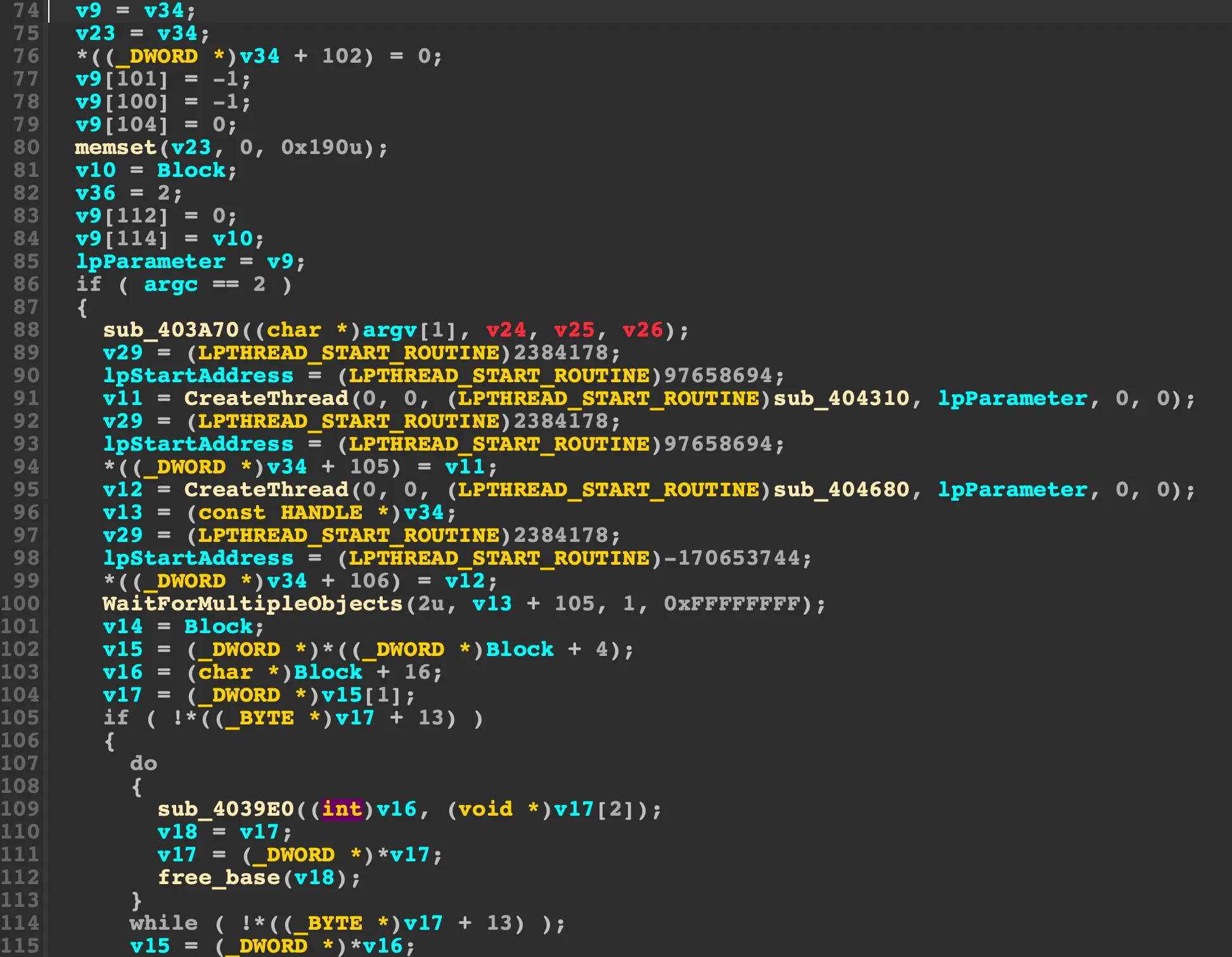2021::Flare-On 8::Write-up
Being smart this year, not write write-up for each challenge, only the script for challenge 9, genius.
OK, this year I’m the first person who finish all flare-on challenges out of 7 from Taiwan (there’s actually an anonymous guy right behind me) and 96th (or 89th) in global ranking.
9 - evil
You should read the official write-up for details, I’m only to explain my python script for deobfuscating the binary here.
First, use python to implement the equivalent of the hash function in binary for searching specific API:
import ctypesimport sys
a = sys.argv[1].encode()
v18 = 64for i in range(len(a)): v18 = ctypes.c_uint32(a[i] - 0x45523F21 * v18).value
print(hex(v18))Use the script above to generate the corresponding hash of Windows APIs, known_hash.py is available on github:
known_hash = {b'CPAcquireContext': 1066826886, b'CPCreateHash': 3394046519, b'CPDecrypt': 3691957472, b'CPDeriveKey': 2034950283, b'CPDestroyHash': 1626920955, b'CPDestroyKey': 347407890, b'CPDuplicateHash': 2349519820, b'CPDuplicateKey': 2086498145, b'CPEncrypt': 2292368120, b'CPExportKey': 803397598, b'CPGenKey': 3709856188, b'CPGenRandom': 87208454, b'CPGetHashParam': 2821118198, b'CPGetKeyParam':...Finally, because IDA Pro can determine the prototype of a function by matching the function’s name. By creating a dummy section which used to place name of API . Then, replace all operations those causing the binary trap to vectored exception handler with call operation which points to the real API names in dummy section to make the decompile result easy to read. But due to the nature of IDA Pro, one have to run the again function and explicitly mark some data as code in IDA Pro multiple times:
import ida_bytesimport idcimport idaapiimport ida_searchimport ida_idpimport ida_nameimport ida_segmentfrom known_hash import known_hash
rev_known_hash = {known_hash[k]:k for k in known_hash}pos_table = {}seg_base = 0x5000000not_found = []ida_segment.add_segm(0, seg_base, seg_base+0x40000, 'flare_ptr', "BSS")
def patch(cur_ea): head = cur_ea for i in range(100): head = idc.prev_head(head) if idc.print_insn_mnem(head) == "mov" and "ecx" == idc.print_operand(head, 0): target = idc.print_operand(head, 1) for ii in range(100): head = idc.prev_head(head) if idc.print_insn_mnem(head) == "mov" and target in idc.print_operand(head, 0): func_hash = int(idc.print_operand(head, 1)[:-1], 16) if func_hash not in pos_table: pos_table[func_hash] = seg_base+ 4*len(pos_table) if not ida_idp.assemble(cur_ea, 0, cur_ea, True, f"call {rev_known_hash[func_hash].decode()}"): idc.set_name(pos_table[func_hash], rev_known_hash[func_hash].decode(), ida_name.SN_CHECK) ida_idp.assemble(cur_ea, 0, cur_ea, True, f"call {rev_known_hash[func_hash].decode()}") ida_bytes.patch_bytes(cur_ea+5, b'\x90\x90') break break
def again(): code_head = 0x401000 while code_head != idaapi.BADADDR: if idc.print_insn_mnem(code_head) == "xor" and idc.print_operand(code_head, 0) == idc.print_operand(code_head, 1): next_head = idc.next_head(code_head) if idc.print_insn_mnem(next_head) == "div" and idc.print_operand(code_head, 0) == idc.print_operand(next_head, 1): patch(code_head) elif idc.print_insn_mnem(next_head) == "mov": reg = idc.print_operand(code_head, 0) op2 = idc.print_operand(next_head, 1) op1 = idc.print_operand(next_head, 0) if ('[' in op1 or '[' in op2 ) and (op2 in op1 or op1 in op2) and (reg in op1 and reg in op2): patch(code_head) code_head = idc.next_head(code_head)Now, we have a nice and clean output:

Original Author: terrynini38514
Original Link: https://blog.terrynini.tw/posts/2021-Flare-On-8-Write-up/
Publish at: November 23, 2021 at 08:00:00 (Taiwan Time)
Copyright: This article is licensed under CC BY-NC 4.0